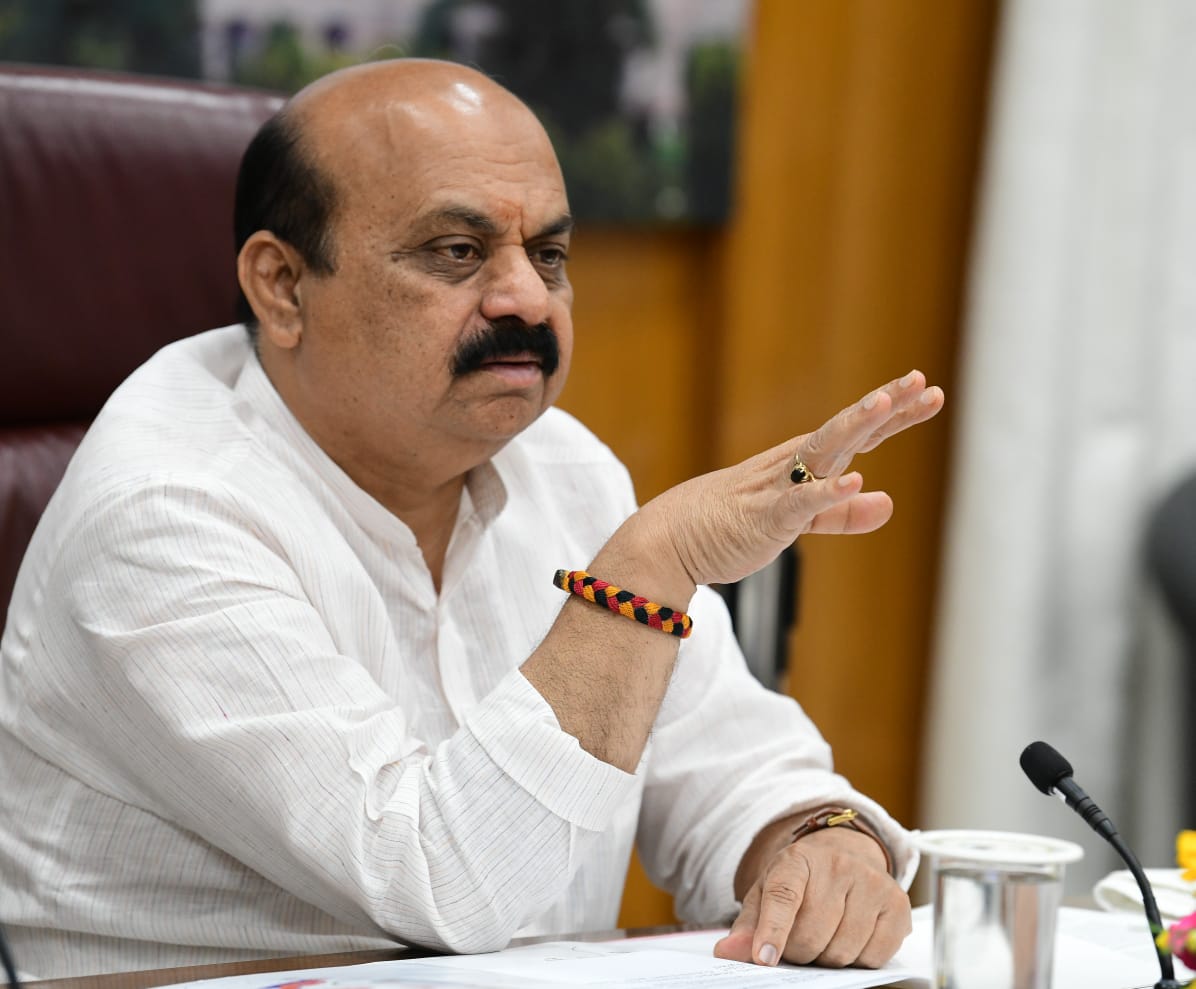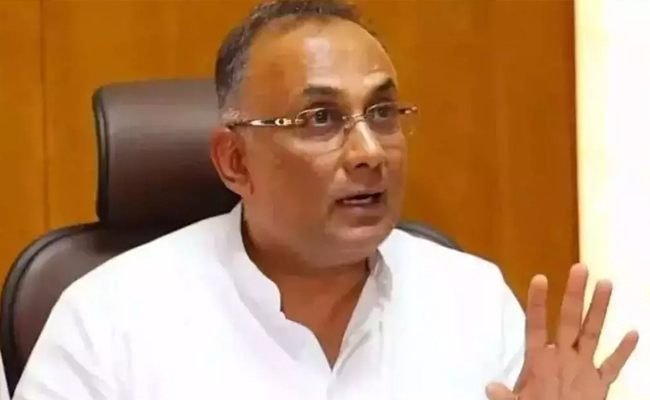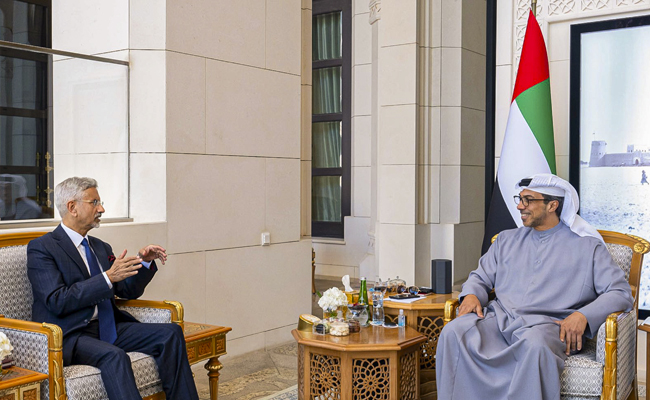Bengaluru, Sep 19: Karnataka Chief Minister Basavaraj Bommai on Monday spoke about the interference of 'influential' people in removing encroachments in the city as part of the flood-mitigation efforts but underlined his government's resolve to "mercilessly" remove the unauthorised structures.
Bommai said he has ordered an inquiry into encroachment of lakes and stormwater drains (SWDs).
He stressed the need to take stringent measures to avoid the recurrence of floods in the city.
"We have to remove encroachments, but influential people interfere and do politics. We will remove encroachments mercilessly because if we don't take harsh steps, there will be flooding again in Bengaluru," he said, when the issue came up in the state Assembly.
The Chief Minister was replying to the queries of the Opposition which had sought to know the reasons for the recent flooding in the city and measures taken by the State government to prevent its recurrence.
Torrential downpour had earlier this month led to a deluge in parts of the city, throwing life out of gear.
A special task force has also been formed to ensure the SWDs are constructed properly as per norms, he said.
"I have ordered an inquiry into the encroachment of lakes and the stormwater drains. It will have a judicial official and two technical experts," Bommai said.
He said the special task force would see to it that in the next three to four years the SWDs are built properly so that the city would not be flooded.
Bommai apprised the House that the Karnataka High Court has given an order that no other agency has the power to grant a stay, be it the deputy commissioner or Tahsildar, on removing encroachments.
He has ordered preparing a comprehensive masterplan involving the Bruhat Bengaluru Mahanagara Palike, Bangalore Development Authority and the Bengaluru Metropolitan Region Development Authority, Bommai added.
Already, there are two masterplans of Bengaluru, but a new one is needed, he said.
He said he has approved Rs 600 crore for the development of Bengaluru, which includes Rs 300 crore for re-modelling of the SWDs.
The chief minister further said he has ordered having sluices in major lakes in all the four valleys of Bengaluru - Hebbal, Koramangala-Challaghatta and Vrushabhavati.
He said he has directed the civic agencies to set up sewage treatment plants to prevent sewage going into the lakes and polluting them.
Earlier, noisy scenes prevailed as the ruling BJP, especially Bommai, tried to turn the tables on the Opposition Congress, accusing it of having taken decisions in the past, while in power, allowing closure of lakes and permitting encroachments, resulting in flooding during heavy rains.
He said, "not only on closing of lakes, inquiry will be also be done regarding encroachments and who gave the licence to it, under which tenure, which official was there, whose political backing was there, and whose benami properties were there... (all) will be inquired into, and the nature of investigation will be made known soon."
"There will be a lot of pressure with rapid urbanisation and it needs a will to halt such things in public life, as the system has deteriorated," he said, and cited a Revenue Department circular in 2018 (during Congress government tenure) to remove lakes that have lost the features of a water body from the maps. It was withdrawn after public outcry.
The Chief Minister was responding to Congress MLA K J George's intervention during the Revenue Minister's reply to a debate on effects or damages caused by rains and floods in the state.
George claimed he was being trolled by the ruling BJP accusing him of closing of lakes in Bengaluru and allowing encroachments, while he was Minister in-charge of the city, and urged the government to conduct an inquiry.
Noting that governments in the past have taken wrong decisions on the ill-advice and been misguided by officials in certain cases, Bommai further said, "it is true that attempts were made to close lakes and remove them from the maps; who were the influential people behind it, will be inquired into."
Welcoming Bommai's statement, Leader of Opposition Siddaramaiah said let the inquiry be done and the guilty be punished, while measures should also be taken to ensure such things do not recur.
However, George, who was Minister during the previous Congress regime, said no lakes were closed during his tenure and there was a proposal to remove such water bodies that have lost existence and those which do not have the features of a water body, from the maps, across the state. But it was not implemented.
Siddaramaiah, jumping in defence of George, said the then government headed by him might have taken a decision based on the situation that existed then, but it was never implemented.
Bommai, sharing details of the then Cabinet decision to remove the lakes that had lost the features of a water body from the maps said, "The then Cabinet's intention is very clear it was to remove right of the public on the such lakes...there are evidences and records for it."
This led to heated arguments between Opposition and treasury benches. Congress tried to defend stating such decisions to convert non-existing lakes into bus stops, places of public amenities and layouts were taken by successive governments in the past, and they alone cannot be blamed for it.
Bommai, however, blamed Congress for the fate of lakes in Bengaluru."
During his reply, Revenue Minister Ashoka said the recent rains were highest in the last 30-40 years and two zones of the city were hit, and it is because of "man-made mistakes". The deluge caused by the downpour is the best for the consequences of going against nature, he said.
Blaming the current government and its Chief Minister for the destruction caused by recent rains and floods is not right, and there was lack of planning and vision on part of the successive governments in developing the city, he further said, adding, 42 lakes have been closed in the city so far.
Ashoka also pointed out that there is no provision in the land revenue Act for the government to authorise closing down of lakes.
Noting that the lakes in Bengaluru were connected to one another which ensured easy flow of water, the Revenue Minister said, "Our lakes have the capacity to store 2 to 4 tmc of water and there would have been no question of lakes overflowing if their systems were maintained well."
He listed out various lakes that were closed or encroached upon in different parts of Bengaluru since the 1970s and said, "you also know who were in power during these tenures."
Ashoka alleged that in some cases lakes were not even shown in the survey reports, and those who were Ministers then and the Cabinet then are responsible for closing of lakes.
This led to a heated debate between Congress and BJP members, as the opposition MLAs accused the government of trying to hide its failure in developing stormwater drains, by digging up old stories which made no sense.
Let the Truth be known. If you read VB and like VB, please be a VB Supporter and Help us deliver the Truth to one and all.
New Delhi: A bill to set up a 13-member body to regulate institutions of higher education was introduced in the Lok Sabha on Monday.
Union Education Minister Dharmendra Pradhan introduced the Viksit Bharat Shiksha Adhishthan Bill, which seeks to establish an overarching higher education commission along with three councils for regulation, accreditation, and ensuring academic standards for universities and higher education institutions in India.
Meanwhile, the move drew strong opposition, with members warning that it could weaken institutional autonomy and result in excessive centralisation of higher education in India.
The Viksit Bharat Shiksha Adhishthan Bill, 2025, earlier known as the Higher Education Council of India (HECI) Bill, has been introduced in line with the National Education Policy (NEP) 2020.
The proposed legislation seeks to merge three existing regulatory bodies, the University Grants Commission (UGC), the All India Council for Technical Education (AICTE), and the National Council for Teacher Education (NCTE), into a single unified body called the Viksit Bharat Shiksha Adhishthan.
At present, the UGC regulates non-technical higher education institutions, the AICTE oversees technical education, and the NCTE governs teacher education in India.
Under the proposed framework, the new commission will function through three separate councils responsible for regulation, accreditation, and the maintenance of academic standards across universities and higher education institutions in the country.
According to the Bill, the present challenges faced by higher educational institutions due to the multiplicity of regulators having non-harmonised regulatory approval protocols will be done away with.
The higher education commission, which will be headed by a chairperson appointed by the President of India, will cover all central universities and colleges under it, institutes of national importance functioning under the administrative purview of the Ministry of Education, including IITs, NITs, IISc, IISERs, IIMs, and IIITs.
At present, IITs and IIMs are not regulated by the University Grants Commission (UGC).
Government to refer bill to JPC; Oppn slams it
The government has expressed its willingness to refer it to a joint committee after several members of the Lok Sabha expressed strong opposition to the Bill, stating that they were not given time to study its provisions.
Responding to the opposition, Parliamentary Affairs Minister Kiren Rijiju said the government intends to refer the Bill to a Joint Parliamentary Committee (JPC) for detailed examination.
Congress Lok Sabha MP Manish Tewari warned that the Bill could result in “excessive centralisation” of higher education. He argued that the proposed law violates the constitutional division of legislative powers between the Union and the states.
According to him, the Bill goes beyond setting academic standards and intrudes into areas such as administration, affiliation, and the establishment and closure of university campuses. These matters, he said, fall under Entry 25 of the Concurrent List and Entry 32 of the State List, which cover the incorporation and regulation of state universities.
Tewari further stated that the Bill suffers from “excessive delegation of legislative power” to the proposed commission. He pointed out that crucial aspects such as accreditation frameworks, degree-granting powers, penalties, institutional autonomy, and even the supersession of institutions are left to be decided through rules, regulations, and executive directions. He argued that this amounts to a violation of established constitutional principles governing delegated legislation.
Under the Bill, the regulatory council will have the power to impose heavy penalties on higher education institutions for violating provisions of the Act or related rules. Penalties range from ₹10 lakh to ₹75 lakh for repeated violations, while establishing an institution without approval from the commission or the state government could attract a fine of up to ₹2 crore.
Concerns were also raised by members from southern states over the Hindi nomenclature of the Bill. N.K. Premachandran, an MP from the Revolutionary Socialist Party representing Kollam in Kerala, said even the name of the Bill was difficult to pronounce.
He pointed out that under Article 348 of the Constitution, the text of any Bill introduced in Parliament must be in English unless Parliament decides otherwise.
DMK MP T.M. Selvaganapathy also criticised the government for naming laws and schemes only in Hindi. He said the Constitution clearly mandates that the nomenclature of a Bill should be in English so that citizens across the country can understand its intent.
Congress MP S. Jothimani from Tamil Nadu’s Karur constituency described the Bill as another attempt to impose Hindi and termed it “an attack on federalism.”



_vb_22.jpeg)

